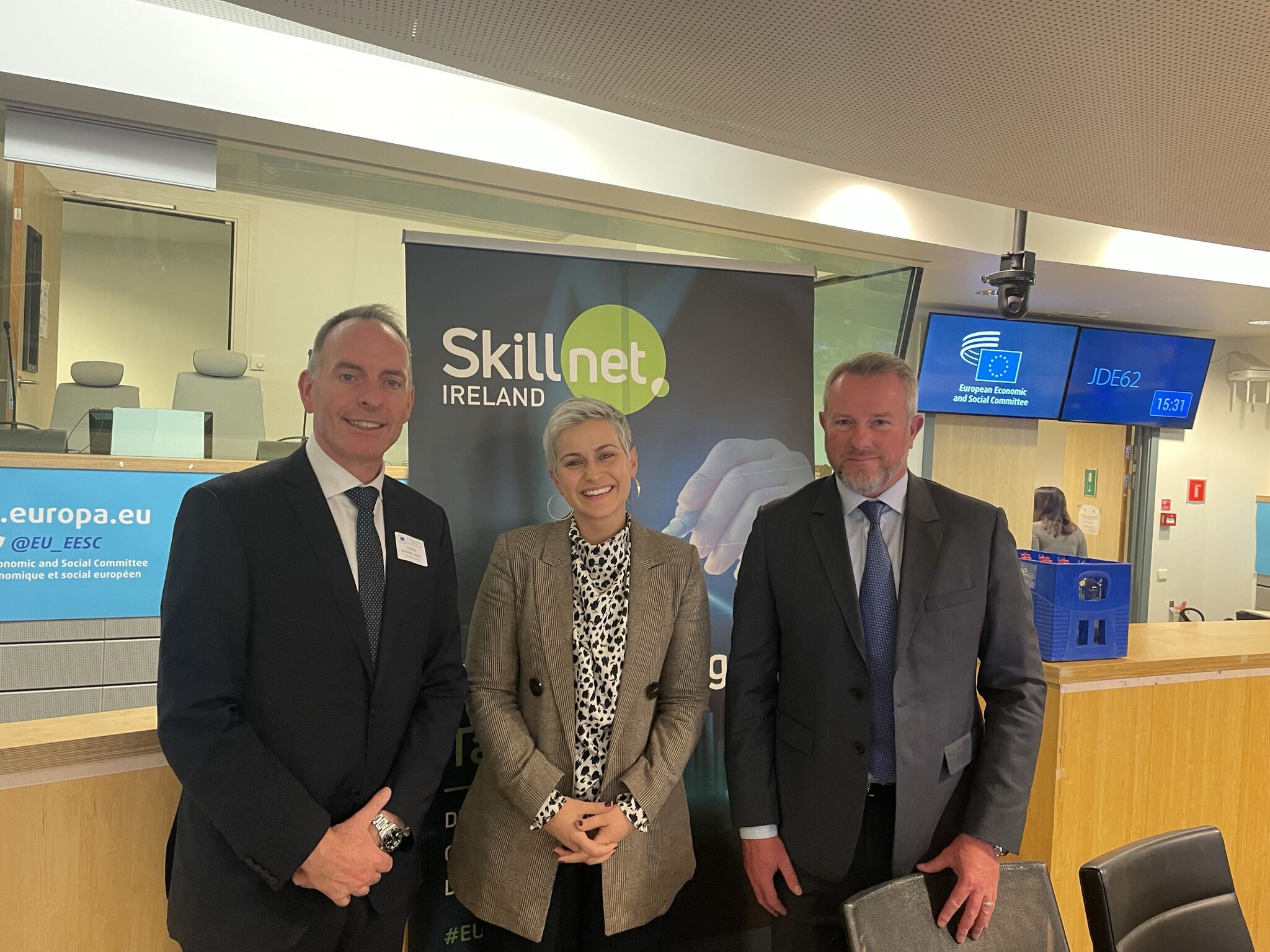The vital importance of upskilling, particularly in areas such as digitalisation and sustainability, and supporting innovative Small and Medium-Sized Enterprises (SMEs) was highlighted at the first ever Digital SME Summit, at the European Economic and Social Committee (EESC), in Brussels.
On November 13th, the inaugural summit was hosted by Skillnet Ireland and the DIGITAL SME Alliance, the largest network of Information and Communications Technology (ICT) SMEs in Europe.
Representatives from Skillnet Ireland spoke at the event, including Brendan McGinty, Skillnet Ireland Chairperson, and Mark Jordan, Skillnet Ireland Chief Strategy Officer. The event was also attended by representatives from Skillnet Ireland Business Networks and industry partners representing Ireland’s technology sector.
Mark Jordan described the Digital SME Summit as an “exciting new venture that recognises the vital role of innovative SMEs in futureproofing the European economy”.
“SMEs in Ireland and across Europe are grappling with a range of new challenges, not least digitalisation and the green transition. Through collaboration with industry, Skillnet Ireland is focused on addressing the upskilling needs associated with these modern challenges, thereby empowering businesses to remain competitive and succeed,” he said.
Brendan McGinty gave a keynote address, opening a panel discussion on ‘The European Year of Skills – Fast-Tracking the Digital Transition with Skills’. Mark Jordan was joined on the panel by Maria Walsh, Member of European Parliament for Midlands North-West; Francesca Borgonovi, Head of Skills Analysis at the OECD Centre for Skills; Patricia Garcia González, Institutional President at Femxa; and Emma Kiraly, Senior Program Manager with JA Europe.
In his address Brendan said: “Now more than ever workforce development is critical to prepare businesses for the future of work.
“The European Digital SME Alliance is working hard to coordinate the Large-Scale Partnership (LSP) for the Digital Ecosystem under the Pact. It’s also managing the European Digital Skills and Jobs Platform, a one-stop shop for digital skills information and resources. I’m delighted to say Skillnet Ireland is a proud partner across many of these projects, including the Digital Europe Programme, Project Eagle, and Digital4Business, complementing our local efforts to support Irish enterprise, and particularly SMEs, in the digital transition, through a variety of upskilling and talent development initiatives.”
During the panel discussion, Mark Jordan highlighted data from Ireland which he said, “shows the willingness of companies” to engage in workforce development, but “there is a gap with what they are doing, with only one in five SMEs who have engaged in upskilling and reskilling in the last two years,” he added.
Meanwhile, MEP Maria Walsh reflected on how “SMEs often find it hard to avail of the tools available to support upskilling” and said more support is needed for initiatives that deliver “very impactful programmes”, like the ones offered by Skillnet Ireland.
Ground-breaking power of technology
The event also heard from the former President of Estonia, Kersti Kaljulaid, who spoke about the impact of the tech sector on her country’s economy. Ms Kaljulaid said the potential for ‘unicorns’ – a tech startup company with a value of over $1 billion – to develop is even greater now in Estonia than in the United States. However, she stressed that large tech companies should be encouraged to bring money back home and support European SMEs. She said SMEs have the ability to spot gaps in the system where they can thrive, but added that a mechanism is needed so smaller companies can grow and work with other bigger European companies.
A fascinating panel discussion on the impact of Artificial Intelligence (AI) on SMEs, in the context of the adoption of the EU AI Act, debated the way the new technology is being perceived and managed across Europe. With policies around the concept of algorithmic transparency, integration of AI in value chains for SMEs and AI regulator in place, Spain is recognised as a leading country in AI regulation. Alberto Gago Fernandez, Spanish Ministry of Economic Affairs and Digital Transformation, said AI is a priority for the Spanish Government. Meanwhile, Emilia Tantar, Chief Data and AI Officer at Black Swan Luxembourg, stressed the importance of the EU AI Act, saying: “SMEs welcome this AI act, but they need to be supported.”
The one-day conference welcomed digital SMEs, representatives from the EU and international institutions, industry associations, researchers, journalists and many more stakeholders.
The summit was designed to build on the strategic role of innovative European SMEs to put Europe at the forefront of technological development while suggesting approaches for a digital society that is fit for the 21st century. The event is dedicated to SMEs, providing a unique opportunity for discussion with a wide range of high-level EU and global stakeholders, to gain cutting-edge insights into challenges and opportunities facing technology SMEs across Europe.
The Digital SME Summit has been developed with the belief that for all European industrial ecosystems to embrace their digital transformation journey, Europe needs to be at the forefront of technological developments; strategically leveraging on bottom-up innovation coming from SMEs which are the backbone of the European industrial base.
Learn more
Full details about the inaugural Digital SME Summit are available online here.
Stay connected with Skillnet Ireland
Receive regular news and insights from the world of talent development straight to your inbox.
By adding my email, I agree to the use of my personal data in accordance with Skillnet Ireland Privacy Policy.



